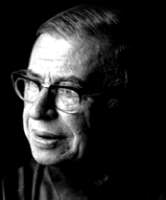Existentialism :
Existentialism is a diverse current of philosophers, who share a distinction between the categories of Being (Sein) and Existence (Existenz), holding that Being cannot be grasped through rational thought and perception, but only through personal existence.
Existentialism has its roots in the 19th century reaction against the “impersonal” Rationalism of the Enlightenment, Hegelianism and Positivism, especially Nietzsche and Kierkegaard. It also includes the Phenomenology of Edmund Husserl. Its founders are Martin Heidegger, Karl Jaspers, Simone de Beauvoir and Jean-Paul Sartre.

Sartre
Jean-Paul Sartre (1905-1980)
Jean-Paul Sartre (1905-1980)
Educated in his native Paris and at German universities, Jean-Paul Sartre taught philosophy during the 1930s at La Havre and Paris. Captured by the Nazis while serving as an Army meteorologist, Sartre was a prisoner of war for one year before returning to his teaching position, where he participated actively in the French resistance to German occupation until the liberation. Recognizing a connection between the principles of existentialism and the more practical concerns of social and political struggle, Sartre wrote not only philosophical treatises but also novels, stories, plays, and political pamphlets. Sartre's personal and professional life was greatly enriched by his long-term collaboration with Simone de Beauvoir. Although he declined the Nobel Prize for literature in 1964, Sartre was one of the most respected leaders of post-war French culture, and his funeral in Paris drew an enormous crowd.
Sartre's philosophical influences clearly include Descartes, Kant, Marx, Husserl, and Heidegger. Employing the methods of descriptive phenomenology to new effect, his l'Être et le néant (Being and Nothingness) (1943) offers an account of existence in general, including both the being-in-itself of objects that simply are and the being-for-itself by which humans engage in independent action. Sartre devotes particular concern to emotion as a spontaneous activity of consciousness projected onto reality. Empasizing the radical freedom of all human action, Sartre warns of the dangers of mauvaise foi (bad faith), acting on the self-deceptive motives by which people often try to elude responsibility for what they do.
In the lecture l'Existentialisme est un humanisme ("Existentialism is a Humanism") (1946), Sartre described the human condition in summary form: freedom entails total responsibility, in the face of which we experience anguish, forlornness, and despair; genuine human dignity can be achieved only in our active acceptance of these emotions.
Sartre's complex and ambivalent intellectual relationship with traditional Marxism is more evident in Critique de la raison dialectique (Dialectical Reason) (1960), an extended sociological and philosophical essay.

(.....I've been thinking. OMG)
No comments:
Post a Comment